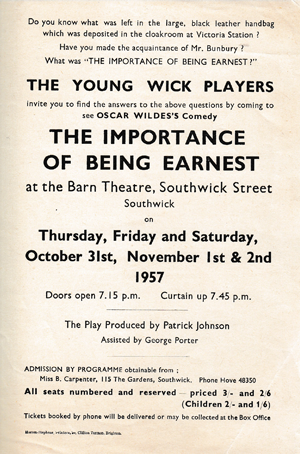Review #1: The Importance of Being Earnest
Publication: Brighton & Hove Gazetter
Publication Data: November 2 1957 issue – page 6
Reviewer: THALIA
Text Header: “Production was sincere”
Text: Content
THE double-doors opened, in paraded the manservant with tea paraphernalia and cucumber sandwiches, and The Young Wick Players were off to a good start on Thursday with The Importance of Being Ernest, at Southwick Barn Theatre.
Ernest is, perhaps, Wilde’s most popular play. With good-humoured satire it gaily mocks at conventional ideas on illegitimacy, wedlock, love and respectable society strata. Impossible to catalogue as simply comedy, or farce, it is certainly a laughter-maker. But production and acting pitfalls abound. The Young Wick achieved much in avoiding many of them.
SINCERITY
Patrick Johnson produced the play with the sincerity he gave to his own rôle as Ernest, which, of course, is the only approach. An excellent, polished portrayal of the lovely, elegant Gwendoline came from Jean Porter and well contrasted was Betty Gedge, graceful and charming, but more vivacity is needed.
Miss Prism – that coy creator of the handbag mishap – was revealed in Betty Carpenter’s delightful character study, while Ralph Dawes also turned in a good performance as Chasuble.
Though commanding in presence and voice, Elizabeth Penney’s Lady Bracknell leaned too close to caricature and Ian Elliott seemed out of his depth as Algy and not always word certain. The aloof-demeanoured servants were convincingly portrayed by Adrian Hedges, Ross Workman and Jacqueline McInnes.
Final performance is tonight.
Review #2: The Importance of Being Earnest
Publication: Shoreham Herald
Publication Data: November 8 1957 issue – page 2
Reviewer: Roy Martin
Text Header: “Wilde was big test for Young Wick Players”
Text: Content
IN The Importance of Being Earnest Oscar Wilde mocked with exquisite rapier-keen wit the absurd manners and hypocritical moral conceptions of his time. It is a comedy in the classic tradition, and one that holds formidable problems for amateur players. It demands sustained brittleness, and the veneer of refinement which often times alludes even professionals. It is, in fact, a tough nut to crack, albeit one well worth the cracking.
The Young Wick Players made a gallant attempt at it at the Barn Theatre, Southwick, last week. The production occasionally was a trifle stiff and self-conscious, and some of the lines needed sharper pointing, but the group had clearly grasped the fact, as one of the characters has it, “style, not sincerity, is the vital thing”, and the wit flashed and glittered in a way the made us realise, sadly, that Wilde had no equal in the contemporary theatre, unless it be Noël Coward.
Comic dilemma
In Wilde’s deliberately absurd plot the name is everything, and a man is only as good as his pose. As the two young men in the anguish of love, Ian Elliott and Patrick Johnson gave assured performances displaying a pretty sense of comic dilemma. The two girls who twist them around their [well-bred] little fingers were delightfully played by Jean Porter and Betty Gedge. Miss Porter’s portrait of the disdainful Gwendolen was beautifully spoken with exactly the right note of elegant malice, and Betty Gedge made a fetching ingénue of the dewy-eyed, worldly-wise Cecily.
Elizabeth Penney lacked the equipment for a really awesome Lady Bracknell, but what she could do she did capably. Ralph Dawes was amiability itself as the wooly-minded Canon Chasibule, but Betty Carpenter did not really ‘get to grips’ with the character of the governess Miss Prism – admittedly a difficult ‘passive’ rôle. Ian Elliott and Ross Workman were suitably austere and dignified as town and country man-servants, and Jacqueline McInnes filled the minor rôle of Tweenie.
The play was produced by Patrick Johnson and George Porter, and although one or two of the key scenes eluded them, they handled most of it with gratifying finesse. The play requires three set changes, a difficulty for even the best-equipped amateurs. The Young Wick’s first set had that utility look, but in the second they managed a charming rose trellis.
Summing up: a wise choice well done.
Review #3: The Importance of Being Earnest
Publication: Unknown
Publication Data: Unknown
Reviewer: Unknown
Text Header: “WILDEAN WIT AT SOUTHWICK”
Text: Content
A DELIGHTFUL performance of Oscar Wilde’s The Importance of Being Earnest was given by the Young Wick Players at the Barn Theatre, Southwick, last night and on Thursday.
This Victorian comedy is too well known to require description. It is enough to say that the players dealt deftly with the Wildean wit and affected the modish manners of the period with an easy grace. Gwendoline [Jean Porter] and Cecily [Betty Gedge] were excellently cast and entirely charming, with Patrick Johnson [who produced] and Ian Elliott well contrasted as John Worthing and his friend, Algernon.
Elizabeth Penney’s Lady Bracknell was bounteously entertaining if not quite sufficiently stiff-backed, and there was some outstanding character acting by Betty Carpenter [Miss Prism] and Ralph Dawes [the Rev. Canon Chasuble, D.D.]
The cast was completed by Adrian Hedges, Ross Workman and Jacqueline McInnes, who splendidly contributed to the atmosphere of polite society as the grave-faced domestics.





